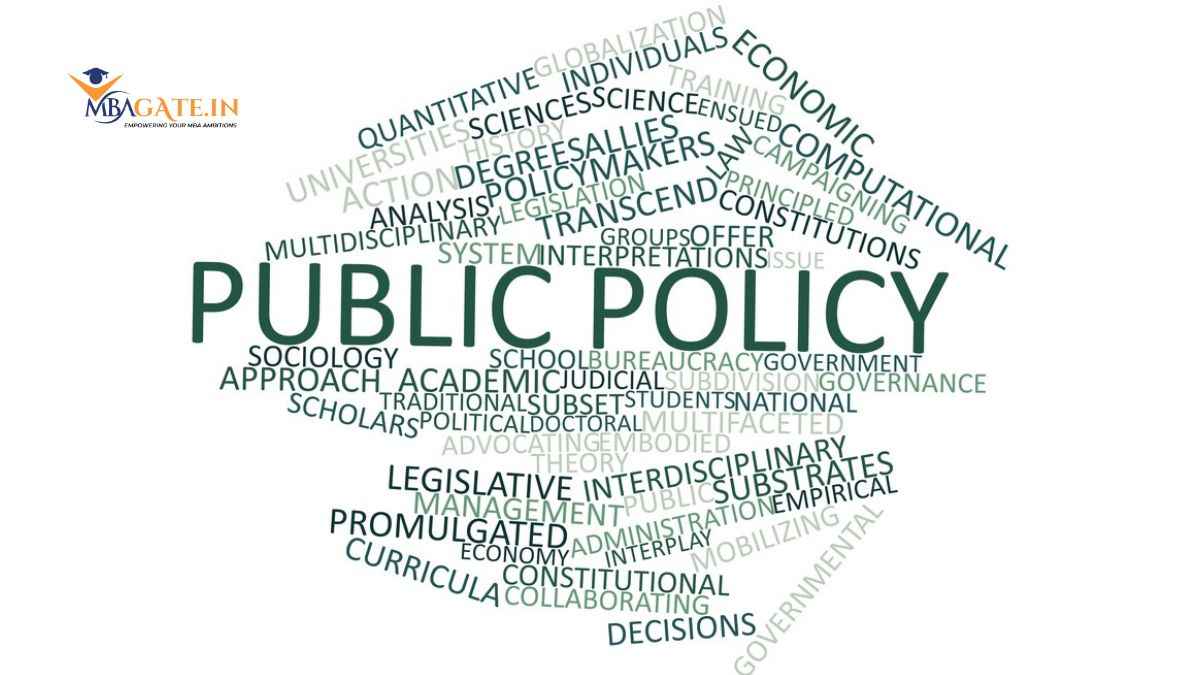MBA in Public Policy
Table of Content
-
- + more items Show less
Additionally, they receive training on how to effectively navigate the legislative process. The main goal of this course is to develop skills that are applicable to business, economics, finance, management and social issues. This course's primary topics include international business, human resource management, business law and marketing and finance. Public budgetary procedures, financial management and executive legislative relations are additional topics linked to public policy.
Students must be eligible to take entrance exams such as the CAT, XAT, CMAT, and NMAT in order to be admitted to the MBA in Public Policy programme. Admission to certain Indian universities is determined by merit. Students must however have graduated from any accredited university with a bachelor's degree and a minimum cumulative CGPA of 50%.
The fee range for a master's in public policy for most of the universities in India is between ₹ 1.65 lakhs to ₹ 26.50 lakhs. For a professional with an MBA in Public Policy, the typical package can reach ₹34 LPA. However, a person's pay is entirely determined by their skills and past experience.

What is Public Policy in India
Professionals can combine their government-focused understanding of public policy with the strategic business skills of an MBA programme with an MBA in Public Policy. Students enrolled in this programme gain the knowledge and skills necessary to make data-driven decisions in the public and private sectors while navigating the intricate political, social and economic environments.
Graduates of this programme will acquire proficiency in fields like governance, public finance, policy analysis and leadership, further equipping them for positions in both public and private organisations such as corporate social responsibility departments or non-governmental organisations. This degree combines business acumen with a deep understanding of politics to prepare professionals to shape public opinion, offer long-term solutions to pressing societal issues and foster positive change.
Ultimately, it prepares leaders to effectively bridge the gap between the public and private sectors to generate meaningful policy outcomes that are supported by empirical evidence. After completing this course, students will be more aware of and capable of effectively managing public programmes and systems. Additionally, they will gain a better understanding of global trends and practices, allowing them to investigate new options and possibilities.
Why study Public Policy courses in India?
A master's degree in public policy can be earned by professionals who want to use their education and knowledge gained from a master's degree in public administration for the benefit of the general public. However, there are a few factors to take into account before considering enrolling in this course:
Students who want to pursue a career in governance and are open to working in public offices and non-profits that address social issues will benefit from this course.
Professionals have the opportunity to learn and gain experience in the fields of management, public relations, marketing, finance and economics.
Upon completion of this course, the professional's research skills and academic intelligence should improve.
Candidates who complete this programme are eligible to work for both public and private government agencies, non-profit organisations, multinational corporations, and consulting firms. Welfare officers, social entrepreneurs, policy analysts and other positions are among the most sought-after positions.
Entrance Exam
To gain admission to prestigious management schools in India for an MBA programme in marketing management, a number of national and state-level entrance exams are administered.
They are as follows:
One of the most well-known entrance exams administered annually in India for admission to management colleges is the Common Admission Test- CAT. Students who wish to enrol in the top management schools must achieve high CAT scores.
The Graduate Management Admission Test, or GMAT for short, is an online test administered annually by GMAC to students in order to determine their eligibility for admission to MBA programmes at both Indian and international universities.
The Common Management Aptitude Test, or CMAT for short, is an annual national exam administered by the National Test Agency (NTA).
Since some deemed private universities in India use entrance exams to determine which students are eligible for admission, some entrance exams are administered on a university basis.
XAT: The XAT exam is administered by the Xavier School of Management and scores are accepted by many other top colleges apart from XLRI.
Eligibility
The following is a discussion of the fundamental requirements for admission to the MBA in Marketing programme:
A bachelor's degree in any field from an accredited university with a minimum passing percentage of 50% or an equivalent CGPA is required of all students.
A 5% reduction from the required passing percentage is granted to students who fall under the reserved category (OBC, SC, and ST).
Admission to prestigious universities such as IIMs and IITs requires a merit score of at least 60%.
If students want to get into the best colleges, they need to do well on the entrance exam.
Admission Process
A bachelor's degree with a minimum passing percentage of at least 50% is typically one of the requirements for admission.
Depending on the requirements of various universities, students must pass entrance exams such as the CAT, XAT, CMAT, SNAP, GMAT and other private university-based exams. Admission to this course will be granted based on the cut-off score.
After passing the entrance exams that their respective universities require, students must show up for both the group discussion and the in-person interview rounds. These rounds are meant to assess students' communication and problem-solving abilities.
The final selection process by the colleges is based on the total score, which is established by the entrance exam results, GD/PI performance, and work experience.
The results of the entrance exam and interview ultimately determine who gets accepted into the public policy MBA programme. Colleges may assign different weights to the entrance exam and interview results.
Subjects
The intensive, broad-based education offered by the MBA in Public Policy programme can give students both specialised knowledge of public policy and general management skills. This is in response to the growing need for public policy graduates in government, business and government organisations. In a complex and interconnected business environment, the program's knowledge and skills are crucial for long-term success and strategic decision-making. Based on a thorough knowledge of social, economic and political issues, the problem-solving element of public policy has become essential for controlling regulatory environments, influencing policy, controlling risk, and meeting public expectations. Students can gain a thorough understanding of the subject by taking courses like Foundations of Public Policy, Stakeholder Management and Community Participation, Organisational Behaviour and Public Leadership, Public Policy Analysis and many more.
Public Policy Colleges in India
A list of public policy colleges in India where one can enrol in an MBA programme in public policy is given in the following table. Learn about the costs of these universities, the average package offered by the organisation, the length of time courses last in various colleges, and the course name that the specific programme is known by at that university.
Colleges with specializations in PGP/MBA Public Policy
According to the NIRF Ranking, the universities listed below are the best for an MBA in public policy. Both public and private colleges are listed in the table. IIM Ahmedabad is a government college that costs ₹26.50 lakhs and offers an average annual package of ₹34.45 lakhs. Jain University, School of Management is one private college that charges ₹21.50 Lakhs and provides an average annual package of ₹10 Lakhs. These universities provide a two-year public policy PGP/MBA programme. Additionally, it highlights the average packages and fees for each college.
List of colleges offering other programs in public policy
Colleges that offer public policy programmes in addition to MBA and specialised MBA programmes are listed in the table. Management fellow programmes, executive PhD programmes, and PhD programmes are among the courses that are mentioned. According to the NIRF, it compiles a list of the top public and private universities offering these courses. The duration of the programme and their fees are also listed in the table. It includes both public and private establishments, including St. Xavier's College in Mumbai and the Jaipuria Institute of Management.
Job Profiles for Graduates in Public Policy Courses in India
Finding a job after receiving an MBA in public policy is challenging and requires excellent organisational, managerial, and communication skills. People in this field should be able to think creatively, make wise decisions and strive for the advancement of society. A candidate can gain interesting experiences, a new perspective and significant career enrichment by pursuing a career in public policymaking.
Future Scope
Given the increasing need for professionals who can navigate the nexus of government, business and society, the future prospects for master's degrees in public policy appear bright. The number of qualified experts who can create successful public policies is growing in order to address issues such as economic inequality, public health emergencies, climate change and technological disruption. Graduates with a degree in public policy are prepared to work in a variety of fields such as international organisations and government agencies. As artificial intelligence and digital governance continue to advance, new avenues for MBA graduates to impact policy through evidence-based methods are opening up.
In a rapidly evolving world where social impact, public leadership and moral decision-making are becoming increasingly important, an MBA in public policy offers flexible career paths.
Regarding the potential future applications of an MBA in public policy, the following factors should be taken into account:
Professionals who pass exams like the NTA-UCG NET-JRF may be eligible to work as assistant professors in Indian institutions and may be able to pursue research opportunities at prestigious universities.
After completing a public policy degree, students can sit for any of the several UPSC-level exams, including the IFS, PSC and CSE.
After earning an MBA in Public Policy, students can choose to pursue an MPHIL in Public Policy. Since an MPhil in Public Policy will acquire extensive knowledge and intense practical knowledge of the subjects, career options in academic research may become available after this.
Conclusion
Students can close the gap between the public and private sectors after they graduate. Graduates can improve the company's social standing. Additionally, graduates can guarantee that policies are implemented effectively and foster innovation. Since the need for people who can combine policy knowledge with business strategies will only increase as global issues worsen, this degree is a great tool for those who are dedicated to having a significant impact on the growth of both business and government.
FAQs
The in-depth knowledge and abilities of various subjects like fundamental management disciplines, policy analysis and management, leadership philosophies and communication and analytical abilities are all provided by this degree. Case studies, videos, expert talks and master classes will all be used to offer the courses by most of the deemed universities in India.
Candidates have a bachelor's degree in any discipline with a minimum of 50% aggregate in CGPA or equivalent from any recognized university. Students who are in their final semester of college are also eligible to apply.
One has to acquire a degree or qualification from any recognized university for four years in the following listed fields:- Public policy, Educational, Political science, Public administration, International Business Relations, Legal Studies, Sociology, Education, Statistics.









